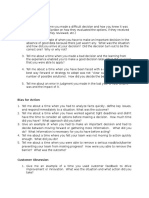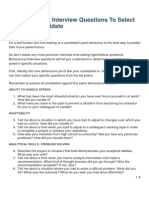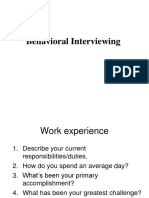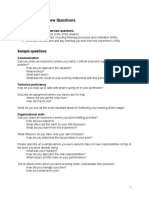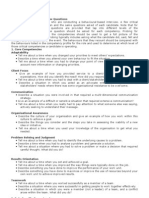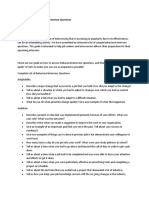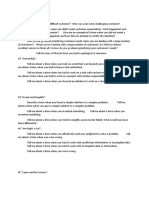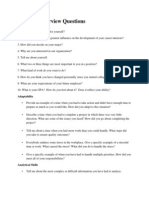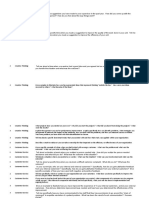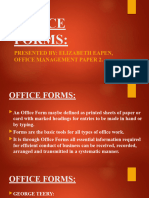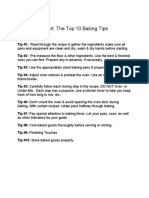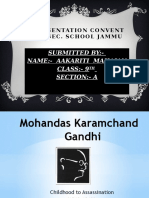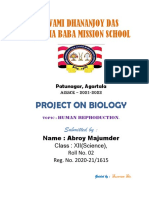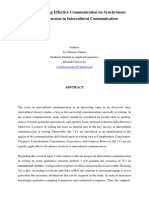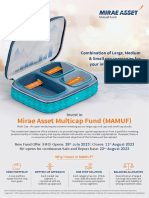Competency Question Bank
Professional Standards
Personally Exhibits high standard of excellence. Fully complies with the dunnhumby code
of conduct and has basic understanding of dunnhumby core systems
1. Tell me about a time when there was a clash between the interests of the whole
organisation and those of your unit or yourself.
How did you deal with the situation?
What was gained by your actions?
What learning did you take from this situation?
2. Give me an example of a time where your understanding of your organization enabled
you to get something you needed that, had you lacked the understanding, you probably
would not have gotten.
3. Describe the culture of your organization and give an example of how work within this
culture to achieve a goal.
4. Describe the things you consider and the steps you take in assessing the viability of a
new idea or initiative.
5. Tell me about a time when you had to lead a successful collaborative effort
Why was collaboration important?
What was involved?
What resistance did you have to overcome? How?
How did you create a sense of common purpose?
6. Describe a situation when you needed the cooperation of many diverse people in order to
succeed. How did your approach vary from one person to the next?
7. We place a very high value on ethics and values. Tell me about a time when your
personal ethics and values were tested.
8. Discuss a time when you had to deal with major change in your work process or job
duties. How did you prepare for the change? How did you respond in this situation?
9. Give an example of a time when you implemented a company initiative that you did not
support. How did you handle this situation?
10. Sometimes policies exist that we don’t agree with. Tell me about the last time you
disagreed with a new policy or procedure.
11. Give a specific example of a situation in which it was imperative that you maintain
confidentiality, yet someone asked you to release the confidential information. What did
you do?
12. Tell me about a time when you were asked to represent your company in a public setting
(e.g. customer interaction, community event, interview, etc.).
13. If there is one aspect of your behavior at work you would like to change, what is it?
What steps have you taken to address this? Provide specific examples.
14. Give an example of how your company’s vision for the future impacted one or more
daily decisions you have made.
�Commercial Acumen
Builds strong, professional mutually profitable relationships with clients which exceed
expectations
1. Provide an example of a time when you had many demands placed on your time. How
did you ensure that you were available to meet the needs of your customers, as well as
your coworkers, supervisors, and subordinates?
2. Give me an example of a project or initiative you had to manage where you had to
demonstrate your awareness of the economic and business environment. Were you
successful?
3. Can you describe a time when you used financial data to identify key business planning
issues or concerns?
4. Describe a time when you identified and capitalized on a market trend that enhanced your
competitive advantage. How did you recognize the trend? What actions did you take?
What was the outcome?
5. Describe a time when you had to adjust your schedule or workload to ensure that you
could meet a customer's needs. How did you meet these responsibilities?
6. Explain a time when you were NOT able to respond to a customer as quickly as
promised. What led to this outcome? How did you handle the situation? What, if
anything, would you do differently?
7. Describe a time when you worked with a difficult customer. In what ways was the
customer difficult? How did you respond to the customer? How did the customer respond
to you?
8. Describe a situation in which you anticipated, identified, and met a customer's needs.
How did you know about the customer's need?
9. Tell me about a situation when you received either positive or negative feedback from a
customer. Why does this particular example stick out in your mind? What did you do
with that feedback?
10. Tell me about a time when you had to go out of your way to assist a customer. Describe
the circumstances. What was the outcome?
11. Give a specific example of a request made by a customer that could not be
accommodated. What was your response? What was the customer's response?
12. Give a specific example of excellent customer service you provided. Why do you think
this was an example of excellent customer service?
13. Customers can be very demanding. Tell me about a time when you had to manage a
customer's expectation in order to avoid an unreasonable commitment.
14. Sometimes customers have a limited or incorrect understanding of their needs. Tell me
about a time when you had this kind of experience with a customer. What steps/approach
did you take to educate them? What was the result?
15. Keeping alert for trends and shifts in the economy can help you make better
business decisions. Describe a time you made a much better business decision by
picking up an important trend or economic shift.
�Communications
Effectively transfers ideas & information using speech, visual, listening and writing skills to
influence other/gain support
1. Describe a time when you had to use your written communication skills to get an
important point across
2. Tell of a time when your active listening skills really paid off for you - maybe a time
when other people missed the key idea being expressed.
3. Give me an example of a time when you were able to successfully communicate with
another person even when that individual may not have personally liked you (or vice
versa).
4. Describe a situation in which you needed to use different communication styles to
influence stakeholders with differing perspectives.
5. Give examples of a time your communication skills were put to the test
6. Give me an example of a time where, by speaking management’s language, you were
able to convince them to do something that they might not have done otherwise.
7. Tell me about a time where, had you taken time to think about how a higher level
management person or group liked to receive information, you might have been more
successful. If you had it to do over again, what would you do differently?
8. Describe a situation you were involved in that required a multi-dimensional
communication strategy.
Oral
1. Tell me about the most difficult or complex idea, situation, or process you have ever had
to explain to someone. How did you explain it? Were you successful?
2. Give me an example of a time you had to be excellent at multidirectional communication
in order to be successful at something.
3. Describe a time when you had difficult communicating your thoughts clearly to another
person or group. What message were you trying to convey? Where did the difficulty in
communicating lie? How did you end up getting your point across?
4. Describe a situation where you had to collect information by asking many people a lot of
questions.
5. Give me an example of a time when you were able to successfully communicate with
another person even when you felt the individual did not value your perspective.
6. Describe a time you observed or were a part of where communication was handled
particularly well by someone else. What did they do? Why do you think it was effective?
7. Describe a time you failed to communicate important information to your boss.
8. Tell me about a time you failed to communicate effectively with your direct
reports/client/customer. How did you find out you had failed to communicate effectively?
What was the implication of this failure? What did you do about the situation? What did
you learn from this?
�Written
1. Give me an example of an important report you have written.
2. Tell me about a time in which you had to use your written communication skills to get an
important point across.
3. Describe the most significant or creative written presentation you had to complete.
4. Tell me about a time where you didn’t document something that you wish you would
have.
5. Give me an example of a time you used written communication to share information that,
in hindsight, you realize should have been shared verbally.
�Understand dunnhumby Ltd
Has a clear understanding of, and can demonstrate, the dunnhumby values. Knowledgeable
about our heritage, services and strategic vision.
1. Tell me about a time when you initiated a procedural change on your own. How did you
present these changes to your supervisor?
2. Give a specific example of a time when you put forth extra effort to attain a goal. Why
was the extra effort necessary?
3. Tell me about a time when none of your supervisors were available to guide or direct you
on a particular project or problem. How did you approach the situation so that you could
continue with your work?
4. Describe how you have changed the way your business unit/department/group operates.
What prompted you to make these changes?
5. In your current position, what do you believe are the primary barriers to full
empowerment and continuous improvement? What have you done to address these
barriers?
6. Tell about a time when you made a difficult decision that was not well received by either
your management or employees. How did you handle the feedback?
7. Give an example when you had to deal with a difficult ethical issue. How did you handle
the issue?
8. In your current position, how do your responsibilities play a part in your department
and/or your company meeting its business goals?
9. Give an example of a time when you worked with resources outside your department to
accomplish an objective. How did this inter-unit collaboration help you better understand
your company’s business?
10. Please describe a project you worked on recently. Explain how your responsibilities as
part of the project team helped your department and/or your company, meet its business
goals.
11. Describe a recent project you were involved in. Explain how the outcome of your project
work affected the operation of other departments and/or business units.
12. Describe a time when you communicated your company’s vision to your employees in an
effort to help them understand the reason for goals and objectives set by the department
or zone.
13. Tell about a project or program you implemented that was directed at enhancing the
organization's competitiveness.
14. Describe a time when you implemented changes brought about by the changing external
business environment.
15. Give an example of how your company’s vision for the future impacted one or more
daily decisions you have made.
�Managing
Effectively plans and organises tasks, projects, time, and resources. Initiates and leads
others to support change
1. Tell me about a time when you failed to meet a deadline. What things did you fail to do?
What were the repercussions? What did you learn?
2. Tell me about a time when you were particularly effective on prioritizing tasks and
completing a project on schedule?
3. Of your current assignments, which do you consider to have required the greatest amount
of effort with regard to planning/organization? How have you accomplished this
assignment? How would you asses your effectiveness?
4. Describe a situation that required you to do a number of things at the same time. How did
you handle it? What was the result?
5. How do you prioritize your daily, weekly, etc. responsibilities?
6. Give me an example of when you had conflicting priorities and how you completed them
on time.
7. Tell me about a time when you used your organizing and scheduling skills to create a
productive work environment.
8. What kinds of project planning and administration to you enjoy in your current job?
9. Describe how you manage to maintain balance between accomplishing projects and
attending meetings.
10. How do you handle interruptions to ensure that you complete your projects on time?
11. In your present position what limits your ability to manage your time? How do you work
with these limitations?
12. What methods or techniques do you use to help manage your time
13. Give a specific example of how you have demonstrated your ability to handle multiple
priorities and deliver results. Describe the situation and the manner in which you
addressed it?
14. Think of a time when you had many demands placed on your time. How did you ensure
that you were available to meet the needs of your customers, as well as your coworkers,
supervisors, and subordinates?
15. Some jobs may be very hectic at times. Provide an example of how you managed to "get
everything done" in a very busy time. What strategies did you use to ensure timely,
quality results?
�Leading People
Maximises and effectively manages the contribution of others. Gains commitment to the
strategic vision and dunnhumby objectives. Develops, motivates and retains talent.
1. Tell us about a time when you’ve adopted a coaching style to improve line manager/s
capability on people practices? How did you communicate the key messages? What
suggestions did you make to ensure this worked for them?
2. Tell me about a time you missed an opportunity to provide a direct report with
recognition for a significant accomplishment. Whey did you miss it? What did you do
when you realized you missed it?
3. Tell me what you have done on a consistent basis to ensure that your direct reports feel
valued for their contributions?
4. Describe a time when one of your direct reports was under a great deal of pressure or
stress. What did you do in the situation? What was the outcome?
5. Tell me about a time that you sensed that something was wrong with one of your direct
reports and talked to him/her about it. What was the result?
6. Give me an example of a time that you realized that one of your direct reports was
overburdened with work. What did you do? How did your action affect the situation?
7. Describe how you coached two different people to accomplish the same tasks. What
similarities and differences were there in your approach?
8. Describe a time when you used feedback to enhance the performance of a direct report or
other employee. What was your approach?
9. Most leaders have had the experience of coaching someone who failed to improve. Tell
me about a time you worked with someone who failed to improve. What might have
caused the failure? What might you have done differently in your coaching strategy?
10. Tell me about a time when you helped a new member acclimate to your department. How
did you go about making him/her feel welcome and a part of your unit? How was the new
member received by your coworkers?
11. Tell me about a time when you helped a new member acclimate to your department. How
did you go about making him/her feel welcome and a part of your unit? How was the new
member received by your coworkers?
12. Give an example of a time when a direct report was not offering any ideas regarding a
problem or issue and you found a way to encourage him or her to contribute.
13. Tell me about a time when members of your work team had difficulty adapting to the
differences (e.g., personal, cultural, etc.) of others on the team. How did you handle the
situation?
14. Leaders often take unpopular positions on organizational issues. Describe a time when
you took an unpopular position. What was the result?
�Courage
What builds (or destroys) value for customers and to do what it takes to address this. We
take the right route, not the easy one.
1. Good leaders deal with corrective feedback in a manner that inspires accountability and
behavior change among colleagues and direct reports. Share a situation that demonstrates
your capability in this competency.
2. Share two examples that demonstrate the fact that you have a commanding presence, yet
that presence is not intimidating to others.
3. Tell me about the time when you found it most difficult to deal head-on with people
problems. What was the most important factor(s) in your success (or failure)?
4. Sometimes, as leaders, it is necessary to administer negative actions. Share two situations
that make obvious your ability to swiftly and effectively take negative action. Why was it
important to do so?
5. Understanding and appreciating the origins and reasoning behind key policies, practices,
and procedures are critical. Describe a situation that demonstrates your skill in this area.
6. Provide an example of a decision you had to make. Describe the situation and the
different alternatives that you generated to solve the problem. How did you choose
among these alternatives?
7. Describe a situation when you firmly believed your point of view was correct, but you
agreed to a different alternative to accommodate others within your department or unit.
Why did you agree to this? What was the outcome?
8. Tell me about a project you generated on your own & what prompted you to initiate it.
Give me an example of how you made a change in a work-related procedure or process,
why you made the change & the results.
9. When convincing others of your ideas, what skills or personal abilities do you use?
Describe a situation where your enthusiasm persuaded a person(s) to your point of view.
10. What risks were you willing to take to achieve goals you set for yourself?
11. Sometimes customers have a limited or incorrect understanding of their needs. Tell me
about a time when you had this kind of experience with a customer. What steps/approach
did you take to educate them? What was the result?
12. Describe a situation when you firmly believed your point of view was correct, but you
agreed to a different alternative to accommodate others within your department or unit.
Why did you agree to this? What was the outcome?
13. Tell me about a time when you had a difficult and/or complex problem to solve. How did
you organize the information you had available? How did you gather more information?
Was your decision/solution effective? Why?
14. Sometimes we believe we have the best solution to a problem, but we can't convince
others of the value. Give me an example of a time when you were able to convince others
of the merits of your idea.






